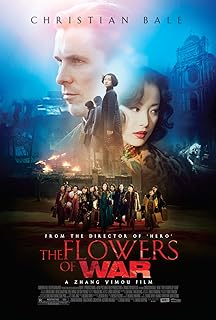電影訊息
電影評論更多影評

2011-12-27 01:35:44
對照紐約時報對本片的評論
看到小組裡很多人討論紐約時報對片子的評價,但是估計不少內容都是以訛傳訛,我把原文找出來給大家看看。文章作者是MIKE HALE。
Eventually, it seems, every senseless waste of life gets its own gauzy tear-jerker. That’s about the only way to justify 「The Flowers of War,」 in which the veteran Chinese director Zhang Yimou revisits the Nanjing massacre of 1937 by making something resembling a backstage musical, with breaks for the occasional ghastly murder or rape.
這段話非常刻薄,原文是說每一件浪費生命的事都有它不疼不癢的催人淚下。作者把看片子歸結為浪費時間,並且片子本身廉價煽情。他說這個片子不過就像一台歌舞劇,只不過是加了些可怕的謀殺和強姦的場面。
往下看。
There’s nothing that says the atrocity blockbuster has to be a disaster in its own right; films like 「Gone With the Wind」 and 「Gallipoli」 have their good points. But long before its two and a half hours are up, 「The Flowers of War」 is sunk by the disproportion between the events being portrayed and Mr. Zhang’s distanced, strangely frivolous treatment of them — in essence, his refusal to take a point of view on one of the most gruesome chapters in Chinese history.
前一段是說張藝謀在電影裡沒有闡述對這場戰爭的評價。作為中國最悲慘的歷史,在影片中沒有被給予足夠的筆墨來描寫,而花大篇幅去描寫了其他的事情("disproportion")。
這顯然是外國人才能有的視角了。作為中國人我們不需要任何評價,我們對南京大屠殺和日本人的感情基本是定性的。而且我認為從日本兵的表現來看也相當明顯。可能外國人看了這個片子對日本依舊不會有什麼憎惡的感情,但是大多數中國人多多少少是會有的。即使看完片子感情就淡了,但是看片期間基本上都會有。不過關於DISPROPORTION這一點我非常贊同。很多鋪敘和刻畫都是為了給片子增加噱頭刻意而為的。繼續往下看。
「Flowers」 has received bountiful publicity for being expensive, state-approved and Oscar-submitted, buzz that got louder last week when the film’s British star, Christian Bale, was forcibly prevented from visiting a Chinese activist lawyer being held under house arrest.
But fears that Mr. Zhang would take a one-dimensional, patriotic approach to the Japanese invasion and occupation of Nanjing (formerly Nanking), while not entirely unfounded, are misplaced. Other recent Chinese films have displayed more sentimental nationalism, jingoism and demonization of the Japanese enemy
前一段是說電影在上映之前就因為它的投資,沖奧等等被廣泛宣傳,而且因為貝爾去看望某人結果被打變得更名。
後一段是說,電影上映前,人們對於張藝謀可能純粹從愛國主義的角度出發看待日本侵略和佔領南京的擔心是多餘的。最近很多的中國電影更加民族情緒化並且醜化日本人(「demonization",詞根是DEMON)。說個題外話,關於醜化日本人這幾個詞網站評論上有個超連結,點進去是葉問= =
His real approach to the events of 1937 is to use them as a backdrop for the kind of deluxe, Hollywood-inspired melodrama that has made him an art-house favorite. In the process he fails to deliver on most of the elements — grandeur, historical sweep, genuine pathos — that would have made the film worthwhile.
Given the right story, as in 「Raise the Red Lantern」 or 「House of the Flying Daggers,」 Mr. Zhang’s almost clinical attention to pretty surfaces and soap-opera mechanics can have entertaining results. In 「Flowers,」 though, you can feel him at war with his material, never settling on a tone or a compelling or even coherent narrative. (The screenplay is by Liu Heng and Geling Yan, based on a novel by Ms. Yan.)
"其實MR,ZHANG只是把戰爭作為這部華麗的好萊塢式劇情片的一個小小的背景(ART HOUSE FAVORITE也是一句帶點諷刺的話,說他的片子華而不實,盡顧著鏡頭漂亮去了)。所有關於歷史哀痛這些可以使得電影變得真正有意義的元素基本上都被遺漏了。"
"如果有好的故事,比如說大紅燈籠高高掛和十面埋伏,MR ZHANG對漂亮的外在幾乎潔癖的喜好和肥皂劇般的機械處理還是可以娛樂大家的。但是在本片中,你可以通過道具感覺到他在描寫戰爭,但是關於沒有任何對於戰爭的基調描寫,不扣人心弦甚至連相關的旁白也沒有。"
這兩段話主要就是說張藝謀太注重鏡頭的漂亮了。比如說關於戰爭,只有視覺的衝擊,但是這部片子不是想變形金剛那樣的視覺電影,關於戰爭的內涵描寫一點都沒有涉及。
Mr. Zhang’s distance from the larger story of the massacre is embodied in his decision to set most of the film within the compound of a fictional European church. The result is an artificial, back-lot atmosphere; the opening scenes, set in the streets, take place in an actual fog of war, with smoke (and at one point the dust from a large mound of flour) isolating the characters from the real world of Nanjing.
這段話還是說把戰爭這樣一個大的背景僅僅通過教堂來表現非常狹隘。外面的哀鴻遍野和教堂被割裂了。
我認為這句話還是西方媒體視覺才有的東西。這個故事本來角度就特殊,也正是它的特別之處。我們對南京大屠殺太了解了,不需要太多戰爭的場景來REMIND我們這是一場怎樣的戰爭。
Mr. Bale plays John Miller, a disreputable American vagabond who happens to be a mortician; as the film begins he is making his way through the fighting toward the church, where he is to be paid to conduct a burial. Also on the move are two groups of a dozen or so young women, the flowers of the title. They are, as a matter of production design if not credible history, visually coded: convent students in severe blue jackets and prostitutes in seductive, rainbow-hued silken dresses.
All of these parties take refuge in the church, with Miller, who dons the robes of a dead priest, bridging the Manichaean divide between the suspicious students upstairs and the contemptuous, defensive prostitutes hiding in the basement. (They quickly transform their cellar into a seraglio; you can practically smell the perfume.) It’s a contrived, hothouse state of affairs, summed up in a scene Mr. Zhang likes so much that he repeats it: the laughing prostitutes sashaying across the churchyard in slow motion, oblivious to the impending tragedy.
這兩段話主要是對劇情和人物關係的複述。後一段末尾說到"妓女們在地窖里嬉鬧的情景(HOTHOUSE STATE OF AFFAIRS),MR ZHANG如此喜歡這個場景,他用慢鏡頭反覆拍攝並把鏡頭引向教堂的墓地,明顯地暗示了接下來的悲劇。"
There will be tragedy, of course, though when it comes it takes a weirdly oblique form. One group eventually performs what appears to be an ultimate sacrifice, full of sexual and social overtones, but this happens off-camera, if it happens at all. The coyness can be explained, perhaps, in terms of the film’s structure — the story is narrated by one of the students, and what we see may correspond to her selective, romanticized memories — but it cannot really be excused.
On-screen, meanwhile, the camera ventures into the outside world in occasional scenes that seem timed to goose the action and remind us that we』re watching a war movie. In one of Mr. Zhang’s few outright concessions to the notion of Chinese supremacism, a lone officer (Tong Dawai) draws a contingent of Japanese soldiers away from the church in an act of hyperbolic heroism. Later, in a surrender to gross sentimentality, two prostitutes leave the church on the sort of insane mercy mission that happens only in movies, with particularly disturbing consequences. Aside from that sequence Mr. Zhang is restrained in his depictions of Japanese brutality, which mostly take the form of threats and intimidation.
「悲劇當然是要發生的,可是當它發生時,卻用了一種彆扭的拐彎抹角的方式來表現。」作者的意思是悲劇是否發生沒有直說,只是通過幾個妓女的說法,從側面表現這一定是一條不歸路,不夠有說服力。「這種含蓄可以理解——因為文章是從一個小女孩複述的角度表現的,可能劇中的一切都被她浪漫化了——可是是不能原諒的」。
其實關於這一點我看電影的時候也有這種感覺,劇里小孩也說「說不定就是請去唱歌呢」。西方人可能也確實對歷史不了解,而且本來他們也非常較真。原著小說里就描寫了後來書娟成年後去找玉墨這些內容,如果電影裡有了這些這個作者也就不會這麼說了。
後一段:「電影中少數幾個教堂外的場景可以讓我想起來我們是在看一部戰爭電影。MR ZHANG為數不多的幾個平鋪直敘的描寫中華民族至上的鏡頭中(原文用了"妥協"這個詞,可以對應前文說的這個片子不是一部純粹的愛國主義情懷的片子),佟大為飾演的中國士兵表現出了極度誇張的英雄主義。隨後發生的兩個妓女外出也是只有電影裡才會發生博人眼淚的情節。MR ZHANG把鏡頭也侷限在了日本人的殘酷上。」
我很能理解西方媒體會喜歡從一個更高的角度來看待戰爭,而不是單獨從某一個民族的角度。但是我認為眾多好萊塢的美式英雄主義已經被他們視為理所當然,中國式的英雄主義在他們看來好像就成了狹隘的民族主義,這顯然是BULL SHIT。南京大屠殺中日本人就是以非正義的侵略者一方出現的,這需要ARGUE嗎?這個片子要表現的本來就不是戰爭的反思,我們不需要站在一個道德的至高點上多麼理性地看待這場侵略。至少作為中國人,作為女性,我做不到,也不想做到。
不過總的說來我認為這個作者(MIKE HALE)還算是客觀的。原著里對於豆蔻出走的那一段描寫更加有說服力。在電影裡完全看不出來豆蔻的性格,出走是顯得太DRAMA。而且佟大為那一段和影片主題關係非常的不大,我把電影中很多的戰爭場面都歸結為撐場面的需要,是冗餘浮誇的。
繼續往下看:
Mr. Bale, turning in a respectable if oddly chipper performance under the circumstances, has the unfortunate task of playing a character who doesn』t really add up. Miller’s conversion from opportunist to savior may be another stock element of this sort of movie, but the scene meant to showcase his transformation is rushed and ineffective. Having made an American the central figure in his film, Mr. Zhang reduces him to wrangling flocks of nubile women, like Cary Grant in a much more violent 「Father Goose.」
這段話說到我心裡去了,和我的意見完全一樣。「MR BALE從一個無賴到救世主的轉變非常倉促,沒有說服力。MR ZHANG讓一個美國人稱為全片的中心,卻讓他和一群少婦糾纏。」
我承認我喜歡看旗袍,也喜歡玉墨扭屁股這些場景。電影中活色生香的元素如果可以讓電影變得更加吸引人,我認為放入其中是無可厚非的。但是這部片子顯然過了一點。滾床單那場戲我看的時候黑線掉滿臉...這是要表達什麼?戰爭中妓女和老外琴瑟和諧的愛情嗎?對美的刻畫原本是多麼令人心動的一件事,可是在這部片子裡越往後越有騷情的嫌疑。
「The Flowers of War」 suffers greatly in comparison to several far superior, less hyped movies about the Nanjing massacre, including the harrowing drama 「City of Life and Death,」 directed by Lu Chuan, and the documentary 「Nanking,」 by Bill Guttentag and Dan Sturman. Those filmmakers came armed with points of view. Mr. Zhang, retreating into the mists of old movies, has declined to take the field
「金陵十三釵陷入與同類型的,更優秀的不那麼知名影片的比較中,(HYPED在這裡是吹噓)比如陸川的南京南京,紀錄片南京等。這些電影創作者都能在影片中表達自己的觀點,而MR ZHANG確拒絕走這一路線。"
全文到這裡結束了。
嚴歌苓最初的中篇小說,也後來改編的長篇我都看了。張藝謀對奧斯卡渴望太深太深了。小說本來的人物結構和電影是大相逕庭的。所有的這一切在我看來都是為了讓影片更國際化,更加具有看點。包括陳喬治成了第13個釵,貝爾是個搞殯葬的化妝技術高超,玉墨怎麼會說英語,還有書娟和他爸爸這些情節原著里都沒有,為了讓影片能為西方觀眾接受做了如此天衣無縫的改編。貝爾這個角色在原著里是不存在的,可以看成是很多個人物的結合,並且改編的迷人,具有人情味。玉墨這個形像在最初的一版小說里也是完全沒有這麼的顛倒眾生。這些為了電影做出的改變卻讓外國人不買帳,好比一個天衣無縫的謊言的漏洞就是因為太ON PURPOSE。改編的結果失去了小說的自然。
倪妮很漂亮,似乎很多人被她演的折服了對吧。可是她到底太年輕了,表現她風情萬種的那些鏡頭在我看來僅僅是對妓女的出色模仿。她很聰明,學的很像,這就是我的感覺,再深一點的感覺就完全沒有了。而且本來,這種風情萬種就在影片裡被不必要的擴大了。
這部片子從一開始就是衝著奧斯卡,國際化這個方向去的,說張藝謀居心叵測可能有點太嚴重了。但是這個故事,從內容來說,就是中國人才能理解的,外國人沒辦法完全領會。一部中國視角的電影要討好好萊塢,所做的改變只會使片子變生硬。結果也確實如此,人家完全不買帳。而且我認為女性也會比男性更能理解(評論的作者是個男性)。關於南京大屠殺,日軍侵華,強姦,慰安婦這些情節。小說里就是13個人後來被送到了慰安所。小說原作者是一個女性,女性的角度是固有的。
總之,這部電影可以更好的。
我剛看完片子就在豆瓣上標記了,當時的評價是「張藝謀曉得自己不是個純粹的電影導演吧?首先他要衝奧,所以戰爭場面冗長但是足夠衝擊——炫技,一定要有不那麼必要的香艷畫面——話題,居然還給他找到了這麼一個這麼完美的國際化的故事。不過這個故事本身太紮實,紮實到讓我一段時間內對日本會有些反胃,所以電影也是毫無疑問值得一看的」,我依舊保持我的觀點。
附紐約時報評論網址http://movies.nytimes.com/2011/12/21/movies/flowers-of-war-zhang-yimou-on-nanjing-massacre-review.html 舉報
評論

